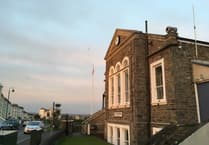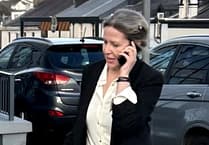Members of the House of Keys could soon begin sittings without saying prayers first.
The House of Keys will next week debate a report into stopping the saying of prayers before each sitting, and doing away with the position of house chaplain. Instead, it would be replaced by a ‘thought of the day’ interlude, where guest speakers or representatives from different faiths could be invited in to give a three-minute talk.
If not, there would be a moment of silence.
Currently, every session of the Keys begins with a prayer led by the house’s chaplain, Archdeacon Andrew Brown.
A formal report into the changes is being brought forward by Garff MHK Daphne Caine, who is doing so in her capacity as deputy Speaker of the House of Keys.
President of Tynwald Juan Watterson said he would be supportive of the move, saying that it would be ‘reflective of a modern House of Keys’.
In the census results, which were published this week, the percentage of people in the Isle of Man who said they were Christian was 54.7%.
He explained how a preceding general discussion had been in agreement that the tradition was not needed.
Mr Watterson said that non-religious members, who despite being required to be in their seats at the beginning of every sitting, may feel as though they do not know what to do with themselves while prayers are being said.
And Mrs Caine said: ‘I think the membership of the House is increasingly secular, and if there are occasions when there are other religions represented either among the membership or amongst official guests that attend sittings, then [we should] question how appropriate it is to continue with the traditional prayers.
‘And that is supported by the number of submissions that were made [when initially consulted], that members felt awkward or uncomfortable with continuing [prayers] in a modern parliament.
‘And I do think it’s a positive thing that the oldest parliament in the world is still evolving and modernising, and I see this as part of a modernisation to suit the will of the House of Keys, providing that is borne out and supported when the motion is put forward next week.’
Asked by the Manx Independent what the Church thought of these potential changes, Bishop Reverend Peter Eagles said that abolishing the house chaplain would leave ‘a serious gap in the care and support available to members’.
care
Rev Eagles said: ‘The role of chaplain to the House of Keys is to provide pastoral care to members of the House, in the light of the responsibilities that they carry as elected political representatives and as prominent figures in public life.
‘It is for this reason that the Chaplain has always been integrated into the public and social business of the House, attending sittings and indeed opening them with prayer, rather than simply being “on call” for when specific issues may arise.
‘It should be noted too that a chaplain is available to members of “all faiths and none”, and can be a point-of-contact to “signpost” onwards to other spiritual traditions as necessary.’
He continued: ‘The presence of a chaplain is also a reminder that political and public life has a spiritual aspect which is not always definable but which is always recognisable at times of need (examples might be the serious illness of a member, death or bereavement, or moments of personal crisis).
‘For these reasons, I believe that the abolition of the post of chaplain to the House of Keys will leave a serious gap in the care and support available to members. I have therefore offered my own ministry as a means of filling that gap, and I understand that this offer has been accepted.’
As for stopping the prayers at the beginning of each sitting, Rev Eagles said: ‘I am certainly supportive of the idea of widening the repertoire, and I have great sympathy with those members who find the current system deeply uncomfortable.
‘While being open to prayers and reflections from other traditions, I would be sorry if the place of Christianity were lost, for the reason that Tynwald and its branches are a Christian construct.
‘The origins of Tynwald and the House of Keys are rooted in the Judaeo-Christian tradition of a caring society which is the basis of liberal Western democracy.
This is very visible on Tynwald Day, the format of which might need to be substantially changed in the light of these proposals.’
He added: ‘Removing the Christian tradition in the spiritual life of the House would be a significant departure from our roots.
‘We rightly and proudly speak of Tynwald as ‘the world’s oldest continuous parliament’, and, within that continuity, it is the Christian ethos and spiritual tradition that is the distinctive strand.’
While the changes would affect the Keys, prayers would still be said before Tynwald.
.jpeg?width=209&height=140&crop=209:145,smart&quality=75)


